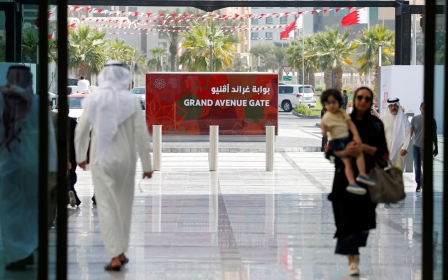Bahrain opposition leader charged of conspiring with Qatar
The imprisoned leader of Bahrain's formerly largest opposition organisation has been charged of conspiring with Qatar to overthrow the government, a crime which is potentially punishable by death.
In a statement, the public prosecution said it was charging Ali Salman, who has been behind bars since 2014 on charges of "inciting hatred against the regime", concerning an alleged phone call made with the then Qatari prime minister in 2011.
State-run Bahrain Television aired a report in August which claimed that neighbouring Qatar was behind anti-government protests that have shaken the tiny kingdom for the past six years.
It reported that Qatar's former premier Sheikh Hamad bin Jassem Al-Thani had contacted Salman - then head of Al-Wefaq, Bahrain's largest opposition group - and asked him to urge protesters to flood the streets and ramp up pressure on the state.
In the calls, Sheikh Hamad and Salman had allegedly agreed to "work together to escalate unrest so as to harm the interests of the nation and undermine its stability, which are tantamount to the crime of communicating with a foreign state with the intention of harming national interests".
Bahrain's Information Minister Ali al-Rumaihi said the communication was a "dangerous link in the chain of Qatari conspiracy against stability in Bahrain and the Gulf", in a statement carried by the Bahrain News Agency.
Salman's wife Alya Radhi stated on Twitter that he denies the charges.
Bahrain, which has a history of disputes over Gulf islands and reefs with Qatar, is home to a Shia majority and has been rocked by Arab Spring-inspired, Shia-led protests demanding an elected government.
The Shia movement Al-Wefaq was the largest bloc in Bahrain's elected lower house of parliament until 2011, when its members resigned en masse in protest at the state's crackdown on demonstrators.
A 2016 court order dissolved Al-Wefaq for "harbouring terrorism", while its leader Salman has been behind bars since 2014.
Bahraini authorities have regularly cracked down on protests, which at times have turned violent.
The state has jailed hundreds of citizens and stripped a number of high-profile activists and clerics of their citizenship.
"Sheikh Ali Salman is already serving a lengthy prison sentence simply for his peaceful political activities," said Sayed Ahmed Alwadaei, Director of Advocacy, Bahrain Institute for Rights and Democracy, in a statement.
te has jailed hundreds of citizens and stripped a number of high-profile activists and clerics of their citizenship.
"Sheikh Ali Salman is already serving a lengthy prison sentence simply for his peaceful political activities," said Sayed Ahmed Alwadaei, Director of Advocacy, Bahrain Institute for Rights and Democracy, in a statement.
"This new case tries to kill two birds with one stone: on the one hand is Sheikh Ali Salman, who the UN has ruled is arbitrarily imprisoned for his political activity as the leader of the opposition, and on the other is Qatar, whose crisis with Bahrain is being used to further punish dissidents. These charges are a vindictive low for the Bahraini regime."
Middle East Eye propose une couverture et une analyse indépendantes et incomparables du Moyen-Orient, de l’Afrique du Nord et d’autres régions du monde. Pour en savoir plus sur la reprise de ce contenu et les frais qui s’appliquent, veuillez remplir ce formulaire [en anglais]. Pour en savoir plus sur MEE, cliquez ici [en anglais].




